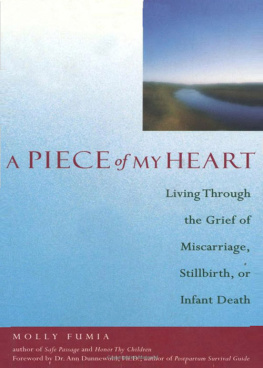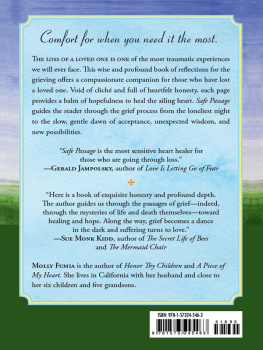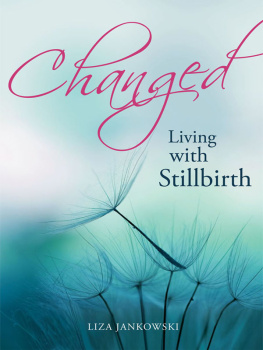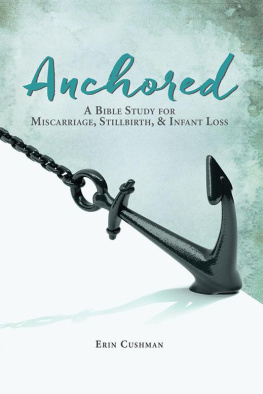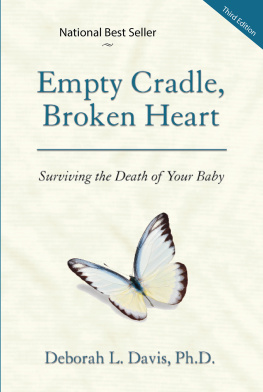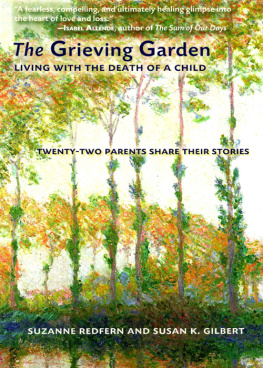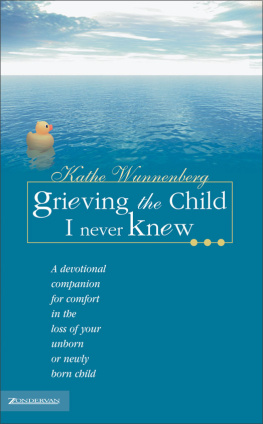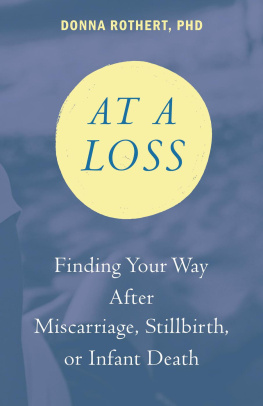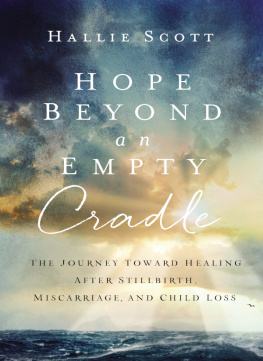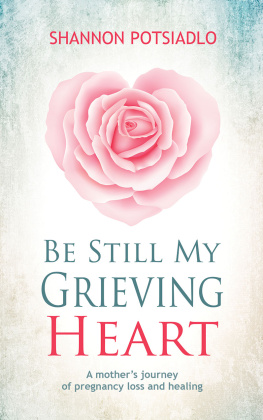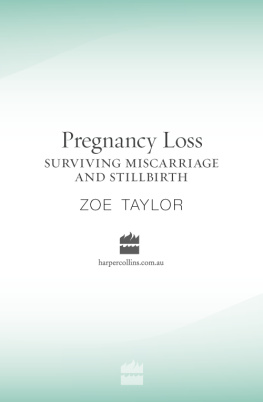
Praise for Molly Fumia's HONOR THY CHILDREN
[A] story that will break your heart and make it whole again. It will bring you into realms of humanness and compassion you didn't know you had. It might even set you free to love in ways you've never loved before. Sister Helen Prejean, author of Dead Man Walking
Honor Thy Children makes the unimaginable compelling, healing, and transformational.Melody Beattie, author of Journey to the Heart
A vital message... traces [the Nakatani's] ordeal with graceful compassion and delicacy, demonstrates that wholeness and healing can be achieved under what seem like impossible circumstances, and that love, trust and acceptance are necessary in every family.San Francisco Chronicle
Praise for Molly Fumia's SAFE PASSAGE
Is there a remedy to grief? Molly Fumia's moving words are indeed helpfulthey are both inspired and inspiring.Elie Wiesel
[A] guide through the passages of griefindeed, through the mysteries of life and death themselvestoward healing and hope. Sue Monk Kidd, author of When the Heart Waits
Safe Passage is the most sensitive heart healer for those who are going through loss. Gerry Jampolsky, author of Love Is Letting Go of Fear
Copyright 2000 by Molly Fumia
All Rights Reserved. No part of this book may be used or reproduced in any manner whatsoever without written permission, except in the case of brief quotations in critical articles or reviews. For information, contact: Conari Press, 2550 Ninth Street, Suite 101, Berkeley, California 94710-2551.
Conari Press books are distributed by Publishers Group West.
Cover Photography: 1999 Richard Pelletier/Tony Stone Images
Cover and book design: Claudia Smelser
Cover Art Direction: Ame Beanland
Library of Congress Cataloging-in-Publication Data
Fumia, Molly
A piece of my heart : living through the grief of miscarriage, stillbirth, or infant death/ Molly Fumia; foreword by Ann Dunnewold
p. cm.
Includes bibliographical references.
ISBN: 1-57324-510-0
1. Grief. 2. BereavementPyschological aspects. 3. Infants (Newborn) DeathPsychological aspects. 4. MiscarriagePsychological aspects. 5. Fetal deathPsychological aspects. 6. StillbirthPsychological aspects. 7. Loss (Psychology) I. Title.
BF575.G7 F85 2000
155.937-dc21
00-020656
Printed in the United States of America
00 01 02 03 MALLOY 10 9 8 7 6 5 4 3 2 1
www.redwheelweiser.com
www.redwheelweiser.com/newsletter
For Chuck
A Piece of My Heart
Foreword
by Ann Dunnewold, Ph.D
author of Postpartum Survival Guide
As human beings, we anticipate parenthood with the hope that all will be well. Not just well, but perfect. We envision the healthy, happy, beautiful baby that we see in parenting magazines. Pregnancy and birth will be the fulfillment of that dream. This will be the most wonderful time of my life, we wholeheartedly believe. As we anticipate parenthood, to have a baby die is unfathomable. Certainly we expect to be outlived by our children, to see our children have children and even grandchildren. Babies are not supposed to die. Yet approximately 1.1 percent of all babies die within the first year of life, according to the National Center for Health Statistics. Around 1 percent are stillborn, and another 10 to 14 percent of known pregnancies end in miscarriage.
Health professionals once believed that the most helpful strategy when dealing with parents who had lost a child was to minimize the developing bond between parent and child. It is best this way, The baby would not have been right, and similar platitudes were common consolations offered to grieving parents. The goal was to help the parents focus on the positive, and thus to separate. This belief stemmed from early work in psychology, which hypothesized that grief was resolved when surviving loved ones forgot the one who had died, breaking the attachment. Unfortunately, Molly Fumia had her first son, Jeremy John, when this practice was still widespread. Now we know that parents have an easier time resolving their grief when given a chance to connect with, care for, and express love for their child. Remembering the infant, continuing the bond, and integrating the memories into your ongoing life is the way to heal. As Molly says, Survival meant never to forget.
Despite the enlightenment of many health professionals to the natural grieving process, the fact remains that it is difficult to be with someone in grief. Whether trained professionals, loving friends, or family members, we all struggle with allowing a grieving person to feel their feelings. It is hard to watch a loved one in pain. Our natural tendency is to want to make it better, by erasing the sadness. This bias is exaggerated in the death of an infant, full-term or younger. Unrealistic societal expectations persist: A miscarriage is not yet a baby, It is good that the loss came early, you were not yet bonded, or You will have other children. Well-meaning people try to comfort the parents by minimizing the loss, attempting to protect them from anguish. Few of us know truly how to help others experience grief so that they can move through it. We let the bereaved parent hide from these overwhelming feelings, because encouraging numbness is safer, less challenging than facing the pain with them. Even when our intentions are good and we want to help a loved one confront their hurt and loss, we lack tools to do this. No one is teaching Grief 101 in high school.
Just as we are ill prepared to support our loved ones through the grieving process, we are even less skilled in recovering from our own devastating losses. New parents are susceptible to the myths about pregnancy loss and infantile death too, and often wonder What is the matter with me for feeling so badlyI barely knew this baby? or I must be weak for feeling this so strongly.
A Piece of My Heart is an invaluable resource for this basic human problem: that we want to brush off the hurt and make the pain disappear. As Molly illustrates here, recovery does not work that way. She offers instruction in the process, the spiritual and emotional journey, which constitutes healing. This book instills hope that you can feel better by confronting the pain, not dismissing it. With her heartfelt descriptions, Molly provides validation of the grieving parent's experience. Her feelings are so true, so normal, as they bubble up around her, threatening to take over her life. It is very human to have emotions come from nowhere when you are grieving. Reminders of your loss are all around you, regularly triggering the sadness and anger you may have thought were resolved.
Crucial and effective strategies for recovery are presented in the final chapter. Molly urges you to honor the grief process, including your right to have your pain and feel it in order to be healed. Do not forget the undeniable mother-child bond, she asserts, including making the child real by using his or her name. She gives permission to remember the past, however long ago. Finally, know that there are others who know how you feel, and sharing your grief is a step to empowerment and healing. A Piece of My Heart clearly shows the way to grief recovery, whether the loss involves a child or other loved one. This book should be required reading for anyone who has experienced the death of a loved one or encounters those who need to grieve. In other words, all of us can benefit from the wise words in this book.
While the bereaved person's tendency is to avoid the pain, Molly suggests that we imagine the pain to be a reminder only of my capacity for love. You may disbelieve, as you are immersed in your anguish, that good can come from this suffering. Indeed, the idea that to move through the pain will make you feel better may sound Pollyanna-ish, or dismissive, or unattainable. You may find that the horror of Molly's experience and of Elie Wiesel's recollections serves to increase your pain. Focus on the hope contained here, not just the loss. Do not take the solutions offered as literally the only way to heal, but use them as a model, trying on what works for you. Everyone is an individual, and Molly's path can serve as a guide for you. You must find your own path to healing, but the healing still can only come through the feelings, not by detouring around them. If the journey seems too overwhelming and painful on your own, search out a grief group and/or professional helper as partner in your pain. Finally, trust your own inner wisdom about what works for you, and what you need to move through the grief into compassion, both for yourself and others.
Next page
